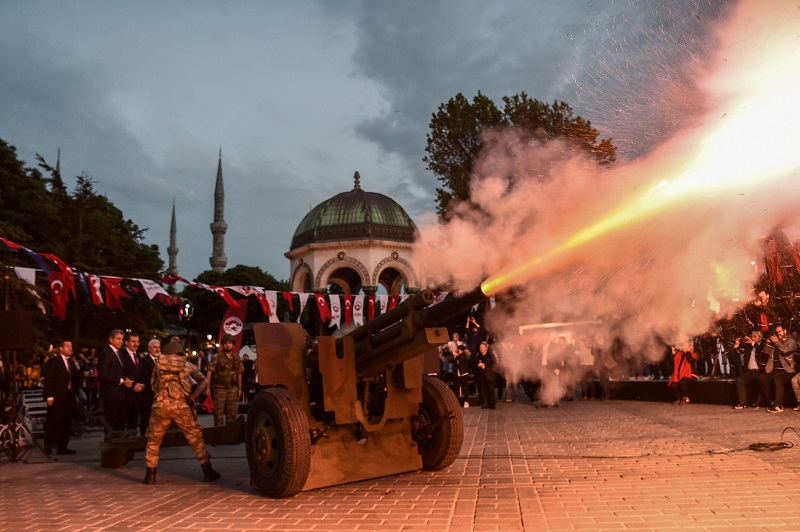The blessed month of Ramadan catalyzes Muslims everywhere into collective worship and prayer. Along with fasting and communal prayer, Ramadan is about honoring traditions and customs.
Although the fundamental essence of Ramadan is the practice of self-restraint through fasting and prayer, taking part in customs and remembering their heritage brings Muslims closer together.
This article explores some of the conventional practices around the world during the month of Ramadan:
Firing of cannons at Iftar in Lebanon and Syria: Midfa al iftar is the rite of firing cannons every day during Ramadan to signal the end of the fast. This practice is said to have begun in Egypt over 200 years ago. At the time, Ottoman ruler Khosh Qadam was testing a new cannon at sunset and fired it by accident.
The civilians heard the resounding boom from the shot and assumed it was a novel way to announce the end of the fast. This ritual made its way into many Middle Eastern and Levantine countries like Lebanon and Syria, where cannons are still used to mark the commencement of Iftar.
Roma Muslims perform folk songs in Albania: Members of the Roma Muslim community in Albania take to the streets to sing ballads to signify the start and end of fasting. The Roma Muslims constitute descendants of Turks, Balkan people, and people from Crimea. Muslim families often invite these singers into their homes to play popular ballads that symbolize the start of Iftar.
Colorful lanterns in Egypt: Egyptians welcome the month of Ramadan by decorating their homes and neighborhoods with colorful lanterns called fanoos. The elaborate lanterns are symbols of unity and delight throughout the holy month. The most common origin story of the fanoos is that on the 5th day of Ramadan in 358 AH, during the Fatimid dynasty, the Caliph Moaezz El-Din El-Allah who founded Cairo, entered the city for the first time.
As the Caliph entered after dusk, the civilians came out in unison to greet him and celebrate his arrival with candles in wooden frames so they may not blow out. These wooden lanterns later became the patterned fanoos lanterns of today.
Children sing for sweets in the United Arab Emirates: Haq al Laila is a popular Emirati tradition that takes place on the 15th of Sha’aban, the month preceding Ramadan. The custom, comparable to the Western ‘trick or treating’, involves children going door to door, singing songs, and asking for sweets and chocolates.
In return for the sweets, the youngsters chant a traditional Arabic song, ‘Aatoona Allah yatek bet Makkah Ywdekom’, which translates to ‘Give us something so that God will bless you and give you more in return’. Practiced all over the Middle East, the children don bright traditional clothes and carry a kharyta (colorful tote bag) as they visit neighborhood homes.
Cleansing rite in Indonesia: As home to the largest Muslim population in the world, religion and culture in Indonesia are often blended. Before Ramadan commences, Muslims all over Indonesia partake in a cleansing practice called Padusan, where they plunge into springs and immerse their body from head to toe. Padusan means ‘to bathe’ in Javanese. A group of revered missionaries called the Wali Songo are the ones who are said to have spread Islam among the Indonesians.
Ramadan Drummers announcing Suhoor in Turkey: Ramadan Drummers declaring the time for Suhoor was a custom in Turkey since the Ottoman Empire. Fully clad in classic Ottoman apparel, complete with a fez and vest adorned with traditional motifs, more than 2,000 Ramazan ‘Davulcusu’ descend onto the streets of Turkey, beating the davul. Similar to the Turkish tradition, Zohridaars in India and town criers in Morocco are also tasked with waking up people for Suhoor. Of late, the Turkish government established a membership card to encourage the younger generation to partake in this age-old custom.
Besides the few Ramadan traditions mentioned above, there are many more beautiful customs specific to the holy month worldwide, including women gathering on the eve of Eid in Pakistan for Chand Raat, and men in Iraq coming together to engage in the traditional game of Mheibes. Along with prayer, Ramadan is about creating strong familial and social relationships that help sustain traditions through generations.

